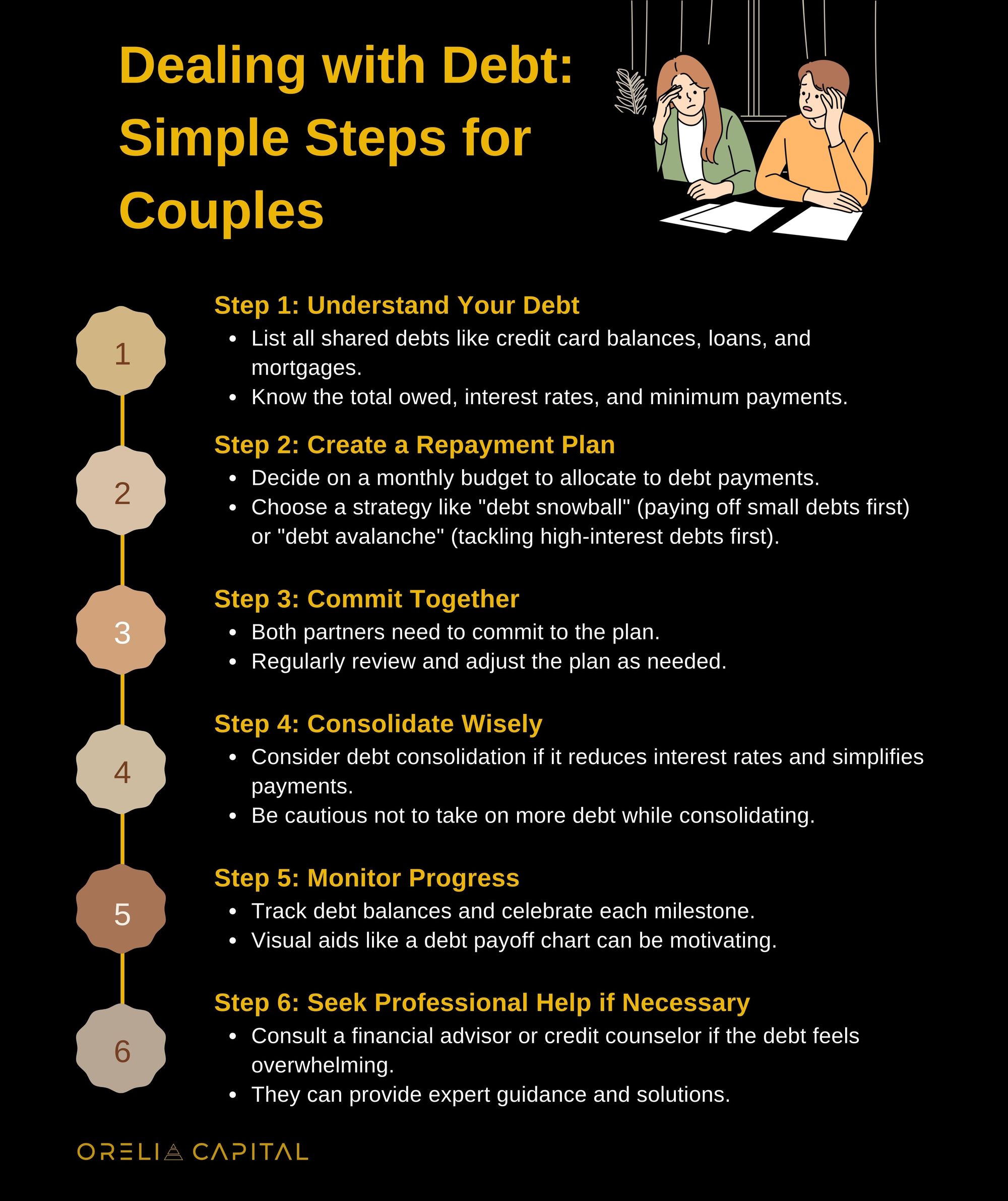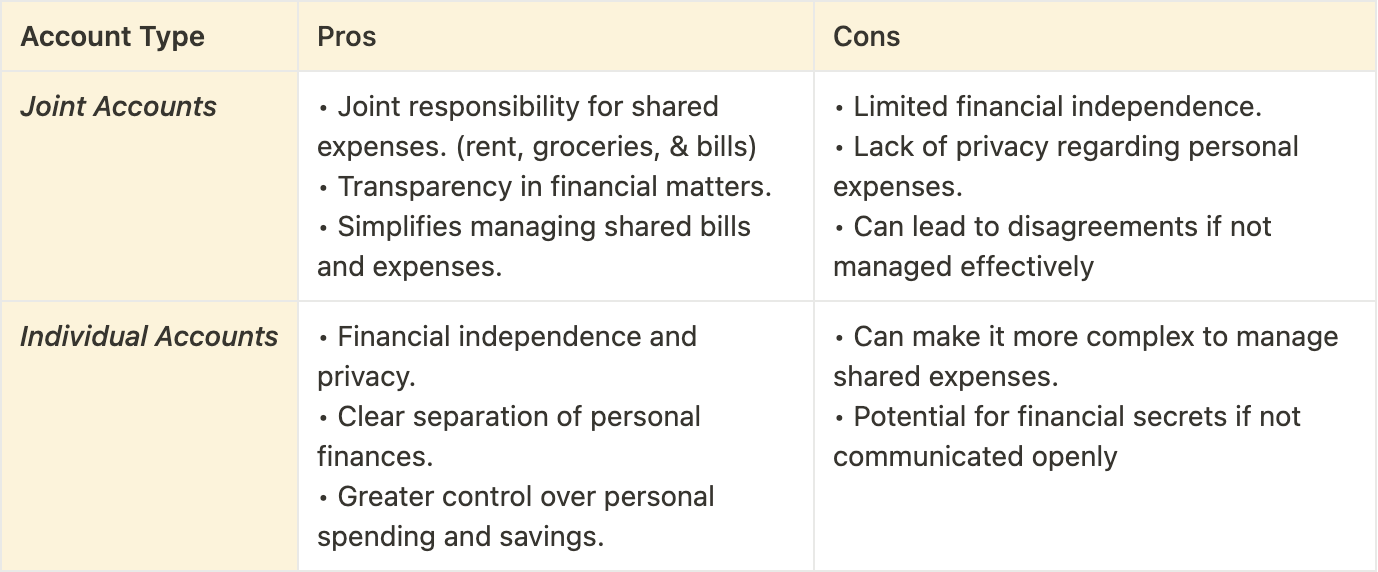Money and Relationships: Navigating Finances as a Couple

Money can sometimes lead to relationship problems, but it doesn't have to. This article is a guide to help you and your partner manage money together. It's all about making things clear and straightforward.
Imagine managing money together as a journey. Just like any journey, it needs planning and teamwork. If you do it right, it can bring you closer as a couple. If not, it might create trouble. The trick is to understand money simply and work together toward your goals.
In this article, we'll explain things step by step. We'll start by discussing how you see money and then move on to creating shared goals. We'll also show you how to make a money plan (a budget) and discuss whether you should keep your money in one place or separate. If you have debts, we'll help you determine what to do about them. We'll also teach you how to set goals and save money for emergencies.
Understanding Individual Money Mindsets:
- Background Shapes Beliefs: People's views on money are influenced by their past experiences and upbringing. For instance, if someone grew up in a family that stressed saving, they tend to lean towards being savers. Meanwhile, those who saw their family spending freely may have a different approach to money.
- Open Conversations: In a relationship, it's essential to have honest conversations about your money mindsets. This means discussing your past financial experiences, what you learned from your family, and how it impacts your money habits today.
- Why It Matters: Understanding each other's money mindsets is crucial to preventing conflicts. For instance, if one person likes to save for the future, and the other prefers spending, knowing this can help avoid disagreements on managing money.
Creating a Shared Vision:
- Think of your financial journey with your partner as an adventure on a ship. You must agree on your destination and goals to sail smoothly, creating a shared vision.
Why it Matters:
- A shared vision helps you stay on the same financial path, working together without conflicts or unexpected detours.
How to Make It Happen:
- Imagine Together: Consider your financial dreams, like buying a house or saving for a special vacation.
- Set Priorities: From your dreams, choose the goals that matter most to both of you. Find common ground.
- Plan It Out: Discuss the steps to reach your goals. Will you save a certain amount each month or invest your money?
- Document Your Vision: Write it down to remind yourself what you're striving for.
- Use Visual Tools: Create a vision board with pictures of your goals or a chart to track your progress.
Budgeting Basics: Making Money Work for Your Relationship
Budgeting doesn't have to be daunting. Simply, it's like creating a road map for your money. Here's how to get started:
- Calculate Your Income: Add up all the money you both earn monthly. This is the total you have to work with.
- List Your Expenses: Write down everything you spend on, like rent or mortgage, groceries, bills, and entertainment.
- Prioritize Needs and Wants: Needs are things like rent and groceries, while wants are things like dining out or a new gadget. Make sure needs come first.
- Set Spending Limits: Decide how much you can spend in each category. This keeps you from overspending.
- Track Your Spending: Write down your daily spending and see if it matches your plan.
- Adjust and Save: If spending too much in one area, figure out how to cut back. The money you save can go towards your goals.
- Emergency Fund: Make sure to set aside a portion for emergencies. It's like a safety net for unexpected expenses. Read "Making Money Moves: Financial Planning for 20-something" by Orelia Capital to learn more.
- Be a Team: Budgeting works best when you and your partner are on the same page. Communicate and make financial decisions together.
For better understanding, consider using "The Budgeting Blueprint by Orelia Capital" for free. Click here to download.

Managing Joint and Individual Accounts

Savings and Emergency Funds:
- Why Save Together: Saving as a couple helps you reach your dreams and handle unexpected expenses as a team.
- Setting Savings Goals: Decide what you're saving for, like a vacation, a house, or retirement.
- Emergency Funds: An emergency fund is like a safety net for unexpected events, such as medical bills or car repairs.
- How Much to Save: Aim for at least 3-6 months' living expenses in your emergency fund.
- Regular Contributions and Automation: Set up automatic savings and emergency fund account transfers to stay consistent with your goal.

Conclusions
In a nutshell, when it comes to money and relationships, understanding each other's money views, setting common goals, making budgets, and deciding how to handle accounts are key. Dealing with debt, planning for the future, and saving for emergencies help build a solid financial bond. You can overcome financial hurdles and secure a happy financial future together by talking openly and supporting each other.

We hope you enjoyed this edition of our newsletter. If you found it helpful, please consider sharing it with others who might benefit from this information.
At Orelia Capital, we believe that feedback is a gift. Your feedback can help us improve our content and provide more value to our readers.





